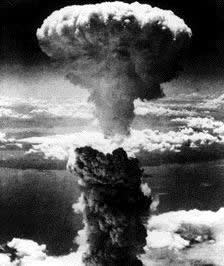|
A-Bomb WWW Museum
Created by professors and students from Hiroshima City University and other universities in Japan, this site describes the destruction wrought by the atomic bombs, including numerous photographs and interviews with survivors.
CNN: Rare Film Documents Devastation at Hiroshima
View a brief clip showing victims' injuries and damage to the city of Hiroshima on this page.
Exploratorium: Remembering Nagasaki
The San Francisco museum observed the 50th anniversary of the atomic bombings with this site, which features photos of Nagasaki's destruction, comments from an online public forum about the bombing, and lists of related resources.
Fifty Years From Trinity
Drawing from a special section of the Seattle Times published for the 50th anniversary of Trinity, this site offers interactive educational activities, a fact sheet, a time line, quotations from figures involved in the Manhattan Project, and links to related resources, in addition to all of the stories from the section. A few supplementary resources explore the Hiroshima bombing.
Hiroshima Archive
Designed as a "a research and educational guide" on the atomic bombings, this site from Lewis and Clark College includes a gallery of work by photographer Hiromi Tsuchida and a directory of related links.
History 122, Development of Modern America: Hiroshima
From a web site developed for the spring 1999 George Mason University course "Development of Modern America," taught by Michael O'Malley and Suzanne Smith, this site provides an overview of " The Dawning of the Atomic Age" and links to resources about the Hiroshima bombing, including photographs, primary source documents, and bibliographies.
Smithsonian National Air and Space Museum: Enola Gay
After controversy surrounding "The Last Act," an exhibition planned for the National Air and Space Museum for the 50th anniversary of the atomic bombings, the original exhibition was cancelled in favor of a straightforward display concerning the technology of the Enola Gay bomber. This companion site to the Enola Gay exhibition, which closed in 1998, describes the plane and provides panoramic movies of its interior and exterior.
Hiroshima: A Look Back
This photo essay presented by Time-Life offers images and first-hand accounts of the bombing and its aftermath.
The Atomic Bombings of Hiroshima and Nagasaki by The Manhattan Engineer District
Read the Manhattan Project report on the effects of the atomic bombings, courtesy of the University of Pennsylvania's Project Gutenberg. An audio file and downloads of the text are offered.
Back to the top
Pages from Sites Listed in General Resources:
Alsos Digital Library For Nuclear Issues: Enola Gay
Alsos Digital Library For Nuclear Issues: Use of Atomic Bombs
Part of the NSF-funded Alsos Digital Library For Nuclear Issues from Washington and Lee University, these pages describe books, articles, videos, and websites relating to the Enola Gay and the Hiroshima and Nagasaki bombings.
Atomic Archive: Historical Documents
The AJ Software and Multimedia companion site to its Atomic Archive CD-ROM includes a page linking to primary source material documenting the bombings and their repercussions.
National Atomic Museum: The Decision to Drop
These pages from the museum's "Virtual Tour" briefly chronicle Truman's decision to use the bomb and the bombings of Hiroshima and Nagasaki.
Trinity Atomic Web Site: Hiroshima and Nagasaki
This section of the site hosted by the Virginia Tech Center for Digital Discourse and Culture includes documents and videos (including an interview with an eyewitness) relating to the bombings.
Back to the top
|

